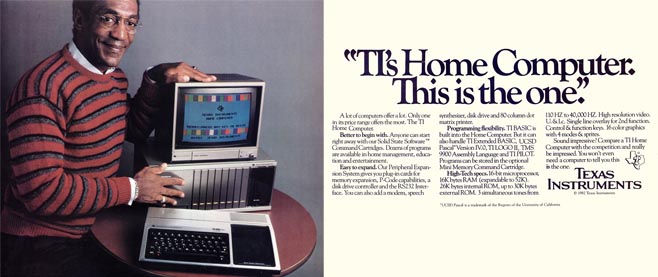
Everything is Bigger in Texas: What Was Your First Computer?
My father got me my first computer for Christmas in 1983. It was a TI-99 4/A. Rather than get me a monitor, he got me a small 13-inch color television to connect to it and that television lasted about ten years. If I looked hard enough I could probably find the home video of me opening those foundation-building gifts that Christmas morning. My cousin also got that same computer that day (he had the voice modulator expansion, however). I never knew anyone with the same machine as us – it felt like we were the only people in the world that had that computer.
By 1984, production of the TI 99 4/A had stopped and Texas Instruments was getting out of the home computer market. The bracketology of the personal home computer market had moved one round closer to the middle but I never felt as though I was missing out on anything. There was no internet, online game stats or cleverly diguised ad-driven social network environments; this was not George Orwell’s 1984. Even removing the filter of 80’s excess, the personal computer market was new and exciting regardless of the your particular type of hardware. When you got something you used it until you yourself got something else, not when the rest of the world told you it was time. I might have wanted a Commodore 64, but I had a Texas Instruments. I was, and still am, proud to say it.
Granted, at the time I was ten years old. Everything is relative.
[pullquote]When I turned up the volume on the TV, I could actually listen to the data move; it had a very real, organic sound.[/pullquote]
I loved that computer, though. It had a cassette tape deck connected to it where you would store data. If you ever used one you understand exactly how awesome yet archaic it was. When I turned up the volume on the TV, I could actually listen to the data move; it had a very real, organic sound. But it was slow! One of the first games I had was, for the time, a very complex flight simulator and it would take about ten minutes to load from the cassette tape.
With Texas Instruments having bailed on the consumer market, there was limited fun you could have with their computers. Unless, of course, you were willing to make your own fun.
I learned how to program BASIC at a very young age. Family Computing was a magazine that I treasured. Every month it had a section full of programs that could be hand coded in BASIC. I diligently typed them all in and saved them to the cassette tape. Some of the programs were nothing more than the equivalent of an e-card for each holiday. I specifically remember one that was a Mother’s Day program and I changed to say Grandma’s Day. That was something.
My favorite weapon for fun was a small soft cover book bought from a B. Dalton bookstore in the mall. It was a book of game programs, again to be hand coded in BASIC. Most of these games involved getting a block from one end of the screen to the other. It was nothing terribly exciting, especially by today’s standards, but I had an imagination and I had seen the movie WarGames, so I knew anything was possible.
I would also call 800 numbers to get catalogues sent to the house with the hope that one or two pages would be dedicated to Texas Instruments. I only ended up owning one game cartridge for the TI: Imagic’s Microsurgeon. Like the movies Fantastic Voyage or Inner Space, you controlled a small ship that was sent into the body to alleviate the diseased areas of the body. Considering the graphical capabilities, this was a pretty advanced looking game. It was exciting and fun and I was able to learn something; before that game I had no idea what a spleen was but to this day I still don’t really know its purpose.
I was certainly no boy genius prodigy but I am proud of my humble beginnings (while at the same time trying not to sound too much like the “back in my day” guy). We are a long way from the days of children using books filled code to create things. Now things come ready made in neat and shiny packages. I am certainly not against change, but how far can you grow with a console? Sometimes the ability to be creative and constructive in one way can be lost within the tides of progress and innovation.
Have you seen a television repair shop lately?





